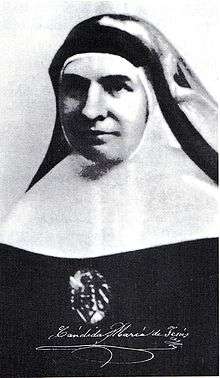Candida Maria of Jesus
- For the Italian nun, please see: Maria Candida of the Eucharist
| Saint Candida Maria of Jesus, F.I. | |
|---|---|
 | |
| Religious and foundress | |
| Born |
May 31, 1845 Andoain, Gipuzkoa, Spain |
| Died |
August 9, 1912 (aged 67) Salamanca, Spain |
| Venerated in | Roman Catholic Church |
| Beatified | May 12, 1996, Vatican City by Pope John Paul II |
| Canonized | October 17, 2010, Vatican City by Pope Benedict XVI |
| Feast | August 9 |
Saint Candida Maria of Jesus, F.I., (Spanish: Cándida María de Jesús; May 31, 1845 – August 9, 1912), was a Spanish religious sister and educator. She founded the Spanish Congregation of the Daughters of Jesus on December 8, 1871, in Salamanca, Spain.
Life
Juana Josefa Cipitria y Barriola was born on May 31, 1845, in Berrospe, Andoain, Guipuzcoa, Spain.[1] Her father was a weaver. The eldest of seven children, rather than attend school, she helped look after her younger siblings.
As a young girl Juana went to Salamanca to help support her family by working as a servant in various homes. She was deeply affected by the depth of poverty she saw in a society undergoing the social effects of the Industrial Revolution in her country. She spent whatever free time she had helping the poor. With the advice of Jesuit Father Miguel José Herranz, she started a number of charitable and educations programs.[2]
Cipitria believed that she experienced a vision of Jesus on Good Friday of 1869. On December 8, 1871, with five companions, the congregation of the Daughters of Jesus (Hijas de Jesús) was established. Juana took the religious name Candida María de Jesús.[3]
Mother Candida María de Jesús founded the congregation for the Christian education of children and youth and the advancement of women in Salamanca. The congregation received approval from the Bishop of Salamanca on April 3, 1873.[1] They opened schools for children and adolescents from all social backgrounds, and Sunday schools for girls employed as domestics.
She based her spirituality on the Spiritual Exercises of St. Ignatius. With the collaboration of Fr. Herranz, S.J., she wrote the Constitutions and they were approved by Pope Leo XIII in 1902.[2] Trust was a marked characteristic of her spirituality and she was never beset by doubt. Her expression, “I distrust myself and place all my hope in you, my dearest Mother”, reveals how deeply she trusted in our Lady, “Star of our way”.
Prayer was all important in her life and she did everything for the glory of God. She was a contemplative, a woman immersed in God who spent long hours before the tabernacle, serene even in trials and suffering. She tried to inculcate this spirit in her daughters and among the pupils at her schools.
She lived and loved poverty above all: “Where there is no room for my poor, neither is there room for me”, she said, while working as a servant in Burgos. As foundress and superior general, she was docile to the will of God and exercised her authority in a spirit of service to her brothers and sisters, governing her religious as daughters of God.
She died in Salamanca, Spain, on August 9, 1912.[2] She was beatified together with Bl. Antonia Bandres, a young Hija de Jesús, on May 12, 1996, by Pope John Paul II at St. Peter's Square in Vatican City.
Canonization
On October 17, 2010, Mother Candida was canonized at St. Peter's Square, Vatican City, together with five other Blesseds.
References
- 1 2 Borrelli, Antonio. "Santa Candida Maria de Jesus Cipitria", Santi e Beati, January 20, 2005
- 1 2 3 Bunson, Matthew et al. John Paul II's Book of Saints, Our Sunday Visitor Publishing, 1999 ISBN 9780879739348
- ↑ Villa, Carmen Elena. "Founder of Daughters of Jesus, Mother Candida, to be canonized", Zenit News Agency, February 24, 2010, Retrieved 20 January 2012.
http://php.manresaschool.edu.ph/Manresa/node/22